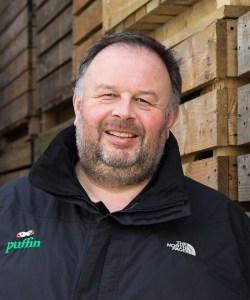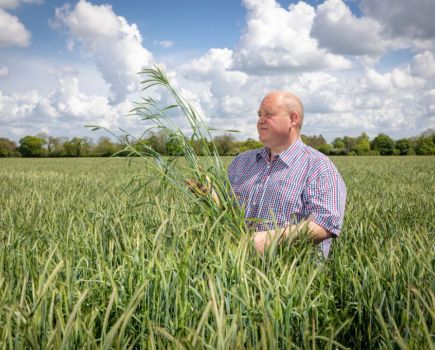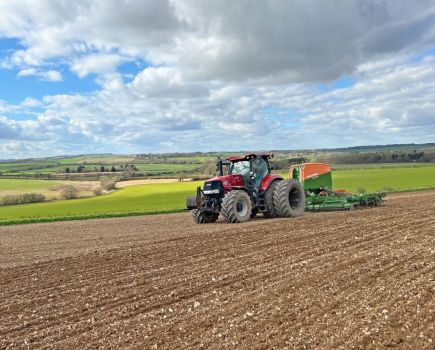Twenty first century farming is a delicate balance between profit-making, food production and protecting the environment. CPM attended a British Crop Production Council seminar to hear how the industry plans to overcome the challenges which lie ahead, based on a ‘fact not fiction’ approach.
“It’s not just about increasing productivity, it’s shifting what we grow.”
By Janine Adamson
If the UK is serious about food security, by necessity it’ll require a profitable farming industry – that was the opening gambit from the British Crop Production Council (BCPC)’s advisory board member, Stephen Howe.
Joined by a range of crop protection experts, scientists and policy influencers at The Farmers Club in London, Stephen’s sentiment was a clear reflection of the theme of the day.
“Information should be based on fact and science, and rather than just talking about it, the government has to understand there’s no quick fix,” said Stephen. “Short-term promises are unlikely to put more food on the table. Farmers require support if they’re to remain at the heart of food production.”

According to Tim Benton, there’s a fundamental mismatch between the food currently grown and optimal global nutrition.
But what does food security actually mean? According to Professor Tim Benton, research director at Chatham House, it’s three-dimensional based on the availability, accessibility and affordability of food. “And by their nature, domestic food systems are exposed to risks arising from fragile and highly interconnected global systems. For example, the shocks experienced in 2022 – the fall-out of COVID-19, the war in Ukraine and extreme weather conditions,” he said.
“From a geopolitical perspective, I believe there’ll be more of these crises coming, not less. Thus there’s a requirement for a complete food systems transformation – to one that’s resilient, provides healthy diets, is sustainable and doesn’t make the environment worse for future generations.”
According to Tim, the underlying opportunity is driven by meat consumption and associated feed supply, and there’s a fundamental mismatch between the food currently grown and optimal global nutrition, particularly with the production of too few fruit and vegetables.
“Diets continue to damage human health at a vast scale. To become health-enhancing, it’s not just about increasing productivity, it’s shifting what we grow,” he said. “A truly sustainable food system won’t arise from simply growing the same produce, but producing it in a different way.”
He then explained that ideas about how best to change the food system to make it more sustainable are often less based on scientific evidence and more based on sets of assumptions – particularly about the future growth of demand, the role the market should play and the involvement of regulation.
Tim said given the food system is already close to breaking, change is inevitable either through force or through planned changed. However, he believes that won’t arise without citizens, farmers and politicians on board.
“From a consumer perspective, change won’t happen straight away because it involves long-term policy support, and at the moment, we’re focused on the short-term. Look at the tobacco industry – years ago everyone smoked but regulations were implemented to make it highly unappealing, and it worked.
“A similar food system transformation is required for human health to protect biodiversity and mitigate the impacts of climate change. A structural market change is necessary and no lever is too small,” he said.
Such levers, he explained, centre around changing the market structure, building market transparency, unlocking a political reset and mainstreaming a strategic, systems approach to change.
To provide an alternative perspective on the seminar theme, Ceres Rural’s George Badger gave his take on farm profitability. George explained that as well as embracing available grant funding from the government, focusing on the business first and foremost is what he believes is key to staying afloat post-BPS.
“There are many distractions in the form of ELMs and natural capital, but it’s important to remain focused on the farm business and what can be controlled,” he said. “Having a handle on the net margin of each crop and benchmarking against peers is very valuable and enables you to make changes which de-risk your rotation.”
A topic George believes isn’t a distraction is carbon auditing. He stressed that despite external pressures, farming has to lower its own emissions first, before striving to offset for others. “Don’t be sidetracked by sequestration, start by understanding crop emissions and whether you can improve NUE. This will help to align your business with future policy,” he said.
Looking to the future, George urged the room to prepare for upcoming opportunities. He said this includes budgeting for 2024 harvest and cropping options, being aware that novel rotations may be required involving herbal leys, pulses and environmental fallows.
And in discussing opportunities, he explained that non-farming income will play an increasingly important role. “Welcoming the general public can be difficult and involves a mindset change, but diversification is where profitable opportunities often lie – such as renting fields for drone testing or letting barns for apple pressing. Ultimately, it’s about maximising the return from every farm business asset,” he concluded.
Offering a practical farm perspective on balancing food security, biodiversity, climate change and the environment, was Andrew Robinson of Heathcote Farms in Bedfordshire. He took on the role of farm manager in 2004 and currently oversees 1233ha across three sites.
Rather than shy away from the matter, Andrew said underpinning all of the farm’s activities are long- and short-term profit-based strategies. This is because since 2011, the desire has been to run the business without a reliance on subsidies, of which they’ve been successful.
“We invest heavily in R&D – this year we have more than 100 trial plots with companies such as Ceres Rural, Unium Bioscience and Openfield. We’re also early adopters of technology, an example being a move to variable rate N, P and K, seed and fertiliser,” he said.
To address the biodiversity challenge, Andrew shifted to a more diverse cropping rotation including winter and spring wheat, barley and oats, peas, beans and oilseed rape. He said key to the success of this is choosing robust, disease-resistant varieties which reduce pesticide reliance.
The farm has also completed detailed profitability assessments, switching low-performing areas over to mid-tier Countryside Stewardship Schemes (flower and nectar mixes) and upped the number of beehives near to pollinator-dependent crops.
On the issue of climate change, Andrew takes a waste-reduction approach. “It’s not just more from less, it’s reducing waste at every opportunity which is something we can all do. We’re also working with a retailer to trial a new product which fixes nitrogen from the atmosphere to reduce synthetic fertiliser use,” he said.
Although personally pivotal in driving these changes, Andrew said it’s vital that wider farm staff are motivated and on board with the vision. For him, this has included providing BASIS and FACTS training and maintaining transparent communication.
To conclude, in reflection of Tim’s presentation, Andrew commented that there are 40,000 edible species on the planet, yet just 12 make up 75% of our food. Consequently, he believes there’s more to be done today, rather than leaving it all until tomorrow.
Presenting his success story, albeit from a food processing perspective, was Huw Thomas of Puffin Produce. Since joining the company, Huw’s overseen significant growth – from 9 to 30M turnover.

West Wales reaps the benefits of natural capital – more rainfall, smaller field sizes and greater biodiversity, according to Huw Thomas.
As well as supermarket own-label potato supply, Puffin Produce is responsible for Blas y Tir – claimed to be the second most recognisable Welsh food brand.
Huw said the success of the business is based on regional ‘Welshness’ and brand loyalty, and the simple action of switching to a Welsh flag on packaging has resulted in a 20% uplift in own-label sales. “Our customers want to support local businesses in their community. This is a fact backed by a survey by the Welsh government, which found eight out of 10 shoppers would prefer to buy Welsh than British,” he said.
“But beyond the consumer, we have a duty to protect our suppliers and recognise the challenges that farming currently faces, which is all hinged on a fair and transparent supply chain.”
According to Huw, the business achieves this by balancing three factors – good relationships with major supermarket chains, industry-leading factory efficiency, and a consistent and transparent financial return for growers.
He also acknowledged the impact of the ‘West Wales advantage’ in achieving supply chain resilience. “Much of the land in Pembrokeshire has never grown potatoes and fresh land yields are consistently 10% higher than tired land. We reap the benefits of natural capital – more rainfall, smaller field sizes and greater biodiversity,” said Huw.
By working with growers to optimise crop rotations, Puffin Produce is on the cusp of launching a new bottling facility, Pembrokeshire Creamery. Huw said this is an exciting move for the business and is based on a circular agricultural economy.
“An example recommended rotation in Wales that accommodates potatoes might include three years of grassland. Soon we’ll be able to better facilitate grazing within that rotation and make the best use of the grass,” he said.
“Not only is this an authentic customer experience with the entire economic footprint in Wales, but we hope to establish a competitive and sustainable milk pricing model too.”
To wrap up proceedings, Stephen surmised that although food security is a confusing subject, the speakers had demonstrated how resilient farming can be, but the question is, how to add value? He concluded by saying taking advantage of advice is essential and that the BCPC is fully committed to driving ‘the agenda of facts’ on behalf of the industry.
This article was taken from the latest issue of CPM. For more articles like this, subscribe here.
Sign up for Crop Production Magazine’s FREE e-newsletter here.




